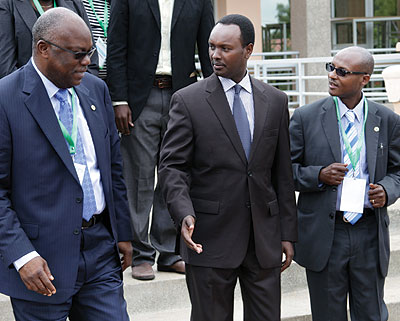African governments must build robust business infrastructures that conform to standards if they are to achieve economic excellence, the African Organisation for Standardisation (ARSO) has said.


African governments must build robust business infrastructures that conform to standards if they are to achieve economic excellence, the African Organisation for Standardisation (ARSO) has said.
This will not only reduce technical barriers to trade, but will also promote and sustain economic growth across the continent, Dr. Joseph Odumodu, the African Organisation for standardisation president, said.
Odumodu also noted that African economies cannot achieve sustainable economic excellence unless they harmonise their standards and fully enforce compliance across the continent.
"The task to bring together African fragmented business is enormous. There is need for all stakeholders, especially political leaders, to make businesses more sustainable by establishing robust business infrastructure that is all inclusive and conforming to international standards,” Odumodu said.
He added that there is also need to strengthen the consumer movement across the continent.
Odumodu was speaking during the ARSO council meeting in Kigali ahead of the organisation’s general assembly scheduled for June 27 in Kigali.
The four-day meeting under the theme; "Standardisation as a driver for improving Africa’s competiveness” has so far attracted over 100 delegates across the continent who will be looking at the ways on how standardisation can be further strengthened on the continent.
Mark Bagabe, the Rwanda Bureau of Standards director general, said there is need to promote intra-regional trade and competitiveness to drive regional growth.
"Intra-African trade is still low and needs to be supported; we have the resources and programmes to make trade on the continent more competitive. However, this can be best done by ensuring that all stakeholders comply with standards,” he said.
Hermogene Nsengimana, the ARSO secretary general, called for uniform standards and conformity assessment procedures on the continent, saying they are crucial to reduce technical barriers to trade and promote investments on continent.
According to Emmanuel Hategeka, the Ministry of Trade and Industry permanent secretary, the problem is not lack of standards but rather what to trade on the international market.
"While it’s true that we should strengthen enforcement on standard compliancy, there is need to increase our production capacities to meet international market demand. The problem is not entirely failure to meet the required standards, but rather falling short of production,” Hategeka said.
Hategeka advised standards bodies to desist from corruption and continue on a journey of harmonising standards across the various trade blocs of Africa.
The African Organisation for Standardisation (ARSO) is an inter-governmental body, established by the Africa Union and United Nations Economic Commission for Africa with the principal mandate to harmonise African standards and conformity assessment procedures in order to reduce technical barriers to trade and therefore promote intra-African and international trade, as well as enhance the industrialisation of Africa.


